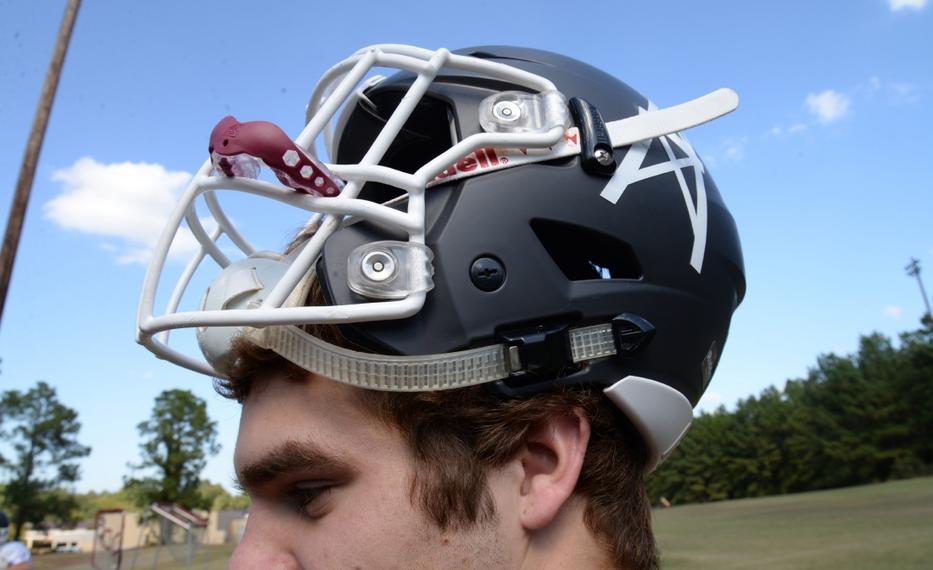
Matthew Dyson keeps his eyes peeled from the sidelines at every varsity White Oak Roughnecks football game.
The scoreboard is irrelevant to the licensed athletic trainer — he’s on a different team, one that’s deployed to 25 or 30 East Texas high schools to shut out concussions.
“I’m always cognizant of anybody that’s kind of swaying as they walk or looking dizzy or saying their head hurts,” said Dyson, part of Good Shepherd Medical Center’s concussion prevention unit. “Anytime we have concussion-like symptoms, we have to take them off the field and out of play until they are seen by a physician.”
The result of hard-impact collisions that are possible in the game of football, brain concussions, can affect a young person for life — or worse. Emerging national recognition of traumatic brain injuries among athletes from grade school to the ranks of pro sports is creating new lines of defense.
The Friday nights of years gone by, when today’s player’s dads played on after dizzying hits, are being outshined by enlightened coaching.
‘Educating the coach’
“One of the biggest differences, as far as making our jobs easier with what we know about concussions and how far along that’s come, is educating the coach to the point when they see that and they don’t say, ‘Get back in there,'” Dyson said. “It’s not like in the old says. They are educated enough to know something’s not right.”
Recognition of the peril of concussion couldn’t be happening too soon for the youngest athletes, whose brains still are forming. And coaches throughout the region increasingly are sidelining players who exhibit signs of concussion.
Players in White Oak, Gladewater, Beckville and elsewhere in East Texas have sat out games with concussions this season. It’s not uncommon anymore.
“Three this year,” White Oak football coach Kris Iske said, adding that the student athletes generally sit out for two weeks with concussions. “Each kid is different. Some recover sooner, and some take more time.”
20,000 baseline tests
Doug Bloyd, sports medicine coordinator for the Good Shepherd Medical System, said Dyson and others on the concussion unit give players a “baseline impact test” that sets a benchmark for cognitive function.
Students showing signs of concussion are screened against their own mental norm.
“We have a battery of tests we use on the sidelines to see whether their brains are functioning (correctly),” Bloyd said.
The Good Shepherd team has given almost 20,000 baseline impact tests to area athletes since being formed about five years ago.
Also the Roughnecks’ athletic director, Iske and his staff stress blocking and tackling techniques to minimize risk of concussion.
“You always want to keep your chin up and your head up,” Iske said shortly before this past Tuesday’s practice.
On the practice field, players wore new Riddell helmets.
“They are tested for impact,” Iske said, noting the headgear’s five-star rating on the Virginia Tech national helmet-rating system. “Another thing we emphasize is good mouthpieces, because you get the jaw impact.”
Dyson, who attends practice once a week as well as every varsity game, said his are not the only eyes on the players’ heads.
“What’s awesome is, when you see their teammates that are there,” he said. “They take care of their own and would come to me and say, ‘You need to check on so-and-so. He’s not being himself.'”
The more eyes on players the better — especially after a concussion has occurred.
Bloyd’s sideline team is on the lookout for what he called second impact syndrome.
New state law
Newly inked state law spells out that adults on the sidelines have to give young players ample time to recover from a concussion.
“One concussion, more than likely the child will recover,” Bloyd said. “The second concussion, if it occurs on top of that one, generally opens a Pandora’s box of problems. … It’s time. He just has to have recovery time. Like any muscle, (the brain) just takes time to heal. Some fully heal, and there’s a small percentage that don’t. You’re dealing with high school-age — their brains are still developing.”
Bloyd has more skin in the game than professional obligation. His son, Chris, is a Roughneck varsity player.
“And he doesn’t want to come off the field for anything,” the father said. “We’re trained to know — we just know.”
He later added, though, that medical science is only at the threshold of brain research.
“The sad part is, we still don’t know a lot of what we need to know,” he said. “There’s no two concussions that are alike. There’s no such thing as a mild concussion — you’re either concussed, or you’re not. We know more, but we certainly aren’t at the point where we’ve got it all figured out.”
ORIGINAL ARTICLE:
http://www.news-journal.com/news/2015/oct/24/east-texas-trainers-coaches-on-closer-guard-agains/